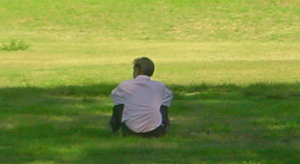Boredom is a really good thing. Rumination is the prelude to creation. Not only is doing nothing one of life’s few remaining luxuries it is also a state of mind that allows us to let go of the external world to explore what’s deep inside our own heads, But you can’t do this if ten people keep sending you updates about what they are eating for lunch. Reflection creates clarity. It is a “prelude to engagement of the imagination” according to Dr Edward Hallowell, author of a book called Crazy Busy. It is a useful human emotion and one that has historically driven deep insight.
It hurts at first, but once you get through the mental anguish you can see things in their proper context or sometimes in a new light. Digital technology, and mobile technology in particular, appears to negate this. If you are trying to solve a problem it is now far too easy to become digitally distracted and move on. But if you persist you might just find what you have been looking for.
By the way, if you have wondered why days seem shorter but more boring as you get older I read an interesting explanation in a science magazine recently. If you accept that familiarity increases with age then the explanation could be that a lack of novelty makes our days seem longer, whereas our recall of these days seems shorter because they are less important. It is essentially a miss-match between elapsed chronological time and psychological time. Hey presto. Going to work is boring. Going on holiday somewhere new isn’t. The point of this point is that if you keep going beyond your boredom life becomes more interesting and seems fuller. Faced with nothing you will invent new ways of doing something.
This is how most artists, faced with a blank canvas, think. Historically children have operated like this too. They become bored. They moan that they are bored but eventually they find something to do – by themselves. Boredom is a catalyst for creative thought. Only these days it mostly isn’t. Today we don’t allow our children the time or the space to drift and dream. According to the UK Office of National Statistics, 45% of children under 16 years-of-age spend just 2% of their time alone.
Moreover, the amount of free time available to schoolchildren in the UK (i.e. the time remaining after going to school, doing homework, sleeping and eating) has declined from 45% to 25% in recent years. Children are scheduled, organised and outsourced to the point where they never have what New York University Professor Jerome Wakefield calls a chance to “know themselves”. It’s the same with adults. Our minds are rarely scrubbed and dust builds up to the point where we can’t see things properly.


Continuing your theme of the third paragraph, have you ever wondered why team seems to go quicker as you get older (e.g. “the years just fly past”)?
A friend once theorised that it’s because a ten year old reflects on the year gone past so slowly because it’s 10% of their life. A 50 year old reflects and wonders why the year went so fast – it was a mere 2% of their life that flashed past!
You want statistics? A survey for BBC radio 3 says that 35% of 24 year-olds say they are bored with their lives. For over-64s it’s just 8%.